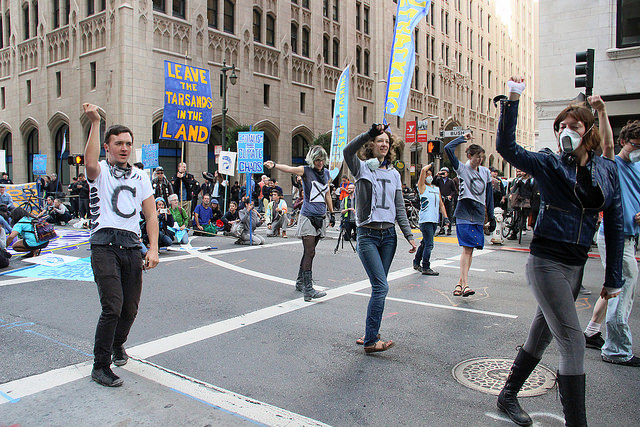Like this article? rabble is reader-supported journalism. Chip in to keep stories like these coming.
World leaders will gather in Paris in just one month to hammer out a treaty to confront the global threat of climate change. It’s real, growing and, based on increasing scientific consensus, clearly caused by human activity. Since the dawn of the industrial age, humans have been dumping pollutants into the sky as if the atmosphere is a bottomless pit, able to absorb an infinite amount of our smoke and exhaust. These greenhouse gasses have been forming a blanket around the planet, trapping the heat of the sun.
The signs of the crisis are everywhere: 2015 is on course to be the hottest in recorded history. Hurricane Patricia plowed into Mexico last week as the largest hurricane ever recorded in the Western Hemisphere. It wasn’t only the power of Patricia, but the speed with which the hurricane formed, almost overnight transforming from a tropical storm.
In the Persian Gulf, scientists reported this week that “certain population centres … are likely to experience temperature levels that are intolerable to humans owing to the consequences of increasing concentrations of anthropogenic greenhouse gases.” In other words, in cities like Doha in Qatar and Dubai in the United Arab Emirates, the daily high temperatures will simply be too hot for people to survive outside for more than a few hours at a time. In the polar regions, ice is melting at unprecedented rates, and the ocean is warming, causing the water to expand. Both phenomena are causing the sea level to rise, already impacting small island nations like Tuvalu, Kiribati and the Marshall Islands in the Pacific, and the Maldives in the Indian Ocean. Hundreds of millions of people will eventually have to flee the world’s coastal cities, scientists predict.
The goal is to limit average global temperature rise to 2 degrees Celsius, or 3.8 degrees Fahrenheit, over preindustrial temperatures. This will require global co-operation on an unprecedented scale, and the decarbonization of the economy. In other words, people will have to stop using fossil fuels like coal and oil, and rely on renewable energy sources like solar and wind. If this transition can be accomplished in time, scientists and policymakers say, before the temperature crosses that critical 2 degree Celsius threshold, then the planet’s climate can be saved. If humans pursue “business as usual” and do nothing or adopt half-measures, climate change will be irreversible and catastrophic.
The stakes are high for the Paris climate summit. Convened by the United Nations, the meeting is called by its shorthand name, COP 21, for the 21st Conference of Parties to the United Nations Framework Convention on Climate Change, or UNFCCC. The process began at the “Rio Earth Summit” in Rio de Janeiro in 1992, culminating in the Kyoto Protocol in 1997. While that was a binding treaty, some countries refused to ratify it, most notably the world’s historically largest polluter, the United States. This time around, each nation will make voluntary pledges to reduce greenhouse-gas emissions, with no obvious way to enforce compliance.
How will the United States radically transform its economy and rid itself of internal-combustion engines, fracked gas and coal plants by 2050? Fossil-fuel industries exert enormous influence on every level of government in the U.S., making even incremental change almost impossible. Thanks to remarkable reporting from Pulitzer Prize-winning InsideClimate News and the Los Angeles Times, we now know that ExxonMobil, as early as the 1970s, studied and understood climate change. Despite this, Exxon concealed its own findings that fossil fuels cause global warming, alter the climate and melt the Arctic ice.
“This is one of the, if not the most important, investigative coups in decades,” said Bill McKibben, founder of 350.org, a global activist group fighting climate change. “Exxon is probably the one institution on Earth that could have short-circuited this 25 years of pretend, faux debate that we’ve been having about climate change.” So incensed was McKibben, he marched down to his local Exxon gas station in Vermont and blocked access to a gas pump, holding a sign that read, “This pump temporarily closed because Exxon lied about climate.” McKibben was arrested, but, to date, no Exxon executives are facing charges for covering up their findings and lying to the world.
While world leaders will assemble for COP 21 at Le Bourget, a sprawling convention centre in Paris, hundreds of thousands are expected in the streets. Protest organizers have called for global actions on Nov. 28 and 29, demanding a fair, ambitious and binding agreement to confront, and ultimately reverse, the potential for catastrophic, human-induced climate change. If the leaders fail, many will be there to storm the Bastille.
Amy Goodman is the host of Democracy Now!, a daily international TV/radio news hour airing on more than 1,200 stations in North America. She is the co-author of The Silenced Majority, a New York Times bestseller. This column was first published in Truthdig.
Photo: Peg Hunter/flickr
Like this article? rabble is reader-supported journalism. Chip in to keep stories like these coming.



